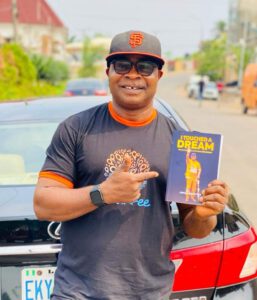Award-winning poet, James Eze, speaks on his new book, ‘I Touched a Dream.’
A gaze into the rheumy eyes of time reveals that every turning point in the history of mankind has been induced by the spoken word. From the Biblical account of creation with its versified “And God said, let there be Light” to the fiery speeches that stampeded men to war like Patrick Henry’s phenomenal “Give me Liberty or give me Death,” much of what we have today as the human race has been shaped by the power of utterance.
Indeed, there is a sense in which the ultimate act of leadership can be reduced to speech-making; the art and science of clothing the hopes and aspirations of a people in a such a way that they approve what they see of themselves through the mirror of the leader’s words. Making speeches is so important that whether we view leadership from the Western model of the earliest Greek societies and the historic speeches of their philosopher-kings or the pre-colonial Igbo society where elders and wise men stirred intense passions with grandiloquent speeches in the village square; leadership would easily become a hollow ritual of empty protocols without speech-making. The hallway of history is therefore not only occupied by great men and women whose acts of courage shook the leaves of time but also by extraordinary leaders whose delicate choice of words inspired men to lay-down their lives that others may find purpose in theirs.

• James Eze
Through the ages, events and circumstances have thrown up men and women whose speeches and utterances calibrate their time; leaving us with sound bites that serve as beacons to the dominant thoughts and concerns of their era. Through the tenderness of their phrases or the anguish of their idioms, humanity is kept abreast of the joys and agonies of their generation. In the deep cadence of their voices, we are compelled to feel the pulse of their time.
Recorded history is so kind that it offers us a long list of these great personages whose voices ring through the millennia like monuments built with words. From Pericles in Attic Greece whose funeral orations turned public speaking into inspiring invocations to Demosthenes who overcame extreme stuttering to ascend the coveted position of the official Orator of Greece; we see a steady evolution in public intellection that made speech making an indispensable part of leadership. The same thread runs through ancient Rome where Cicero reigned in the imagination of his era while contemporary history offers us a long list of leaders whose greatest legacies could essentially be located in their landmark speeches that either pushed the boundaries of our understanding of the intricate nerve cells of modern society and the obligations between the personal and the public or spelt out the interrelatedness of things in hitherto unspoken ways to further stretch our appreciation of humanity as one big mass of connectivity. These are men like Abraham Lincoln whose three-minute of exceptional brilliance in the historic Gettysburg Address became a sacred manuscript of American idealism, like Winston Churchill whose very words evolved into some of the deadliest weapons of the 2nd World War, like Martin Luther King Jnr whose “I have a dream” speech is seen as America’s greatest speech of the 20th Century and praised as one of the fundamental thoughts that shaped modern America or like JF Kennedy’s speech that framed America’s resolve to go to the moon in a sheen of gold.
Closer home, however, many of Africa’s post-colonial leaders reference Right Honourable Dr. Nnamdi Azikiwe and Dr. Kwame Nkrumah as two of the compelling orators of their time. Zik and Nkrumah were famous for their deployment of incredible rhetoric to awaken the consciousness of their compatriots and lead them to the front line of the struggle for independence.
All these recollections help us to see the place of speech-making in purposeful and effective leadership. We cannot underestimate the imperatives of a compelling rhetoric in the process of organizing, motivating and inspiring a people to take charge of their own lives and chart a sparkling pathway to their own future.
I Touched a Dream is therefore an attempt to stitch together in one volume, some of Governor Willie Obiano’s remarkable speeches and public utterances in his eight years in office as the political leader of Anambra State. It offers a rare insight into his thought processes, his reflections and responses to the various puzzles of leadership as they came to him and the thematic engagements that defined his time.
It contains some of his finest thoughts on the weighty questions of leadership, his interpretation of the socio-political and economic realities of Anambra State within the larger context of Nigeria and the difficult choices a people pressed to earth must make to rise to their feet again.
To this extent therefore, this is not just a book of speeches but a catalogue of the strenuous efforts at restoring the depleted confidence of a traumatized people, instilling self-belief and providing the crucial shot-in-the-arm therapy that has ignited dormant passions into a flaming zeal to change the landscape of South Eastern Nigeria.
It is hoped that through the passionate offerings of these selected speeches, the reader is able to peep through the keyhole into the philosophical foundations of Governor Obiano’s approach to leadership.
• Eze is an award-winning poet, reputation management expert and Chief Press Secretary to Governor Willie Obiano of Anambra State.